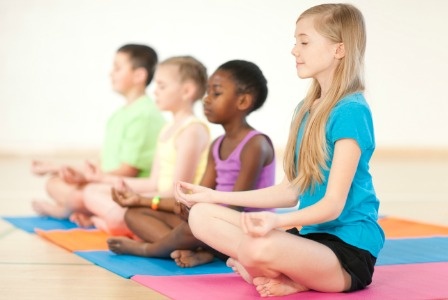Yoga and Mindfulness for Primary Schools 12th April

What is yoga and why should kids do it?
Our children live in a hurried up world of school lessons, computer games, sports and extra curricular activities. Additional they experience the world as a continuous stream of data which can give instant gratification and emotional dilemmas.
We don't usually think of these influences as stressful for our children, but they often are. This non stop pace can have a profound effect of their lives and their sense of joy - often for the worst.
Yoga provides an antidote to these pressures, giving children techniques for relaxation and inner fulfilment, as well as encouraging self-esteem and body awareness in a non competitive environment. Through focusing on the breath and movement they can maintain flexibility, build strength and coordination as well as core stability and body awareness. Allowing their concentration and sense of calmness to improve.
What do we do in a Yoga session
In these sessions we will use the breath and yoga poses to steady the mind and strengthen the body. Using 3000 year old traditional yoga asanas, poses, the children will learn to connect with different parts of the body from the muscles to their own heart beat. As this practice of yoga is non spiritual, we talk about
Yoga for Sporty kids & tweens*
For sporty kids with a passion for one sport or another, a regular yoga practice can help prevent injury and speed recovery after strenuous exercise. As their sporting abilities grows, yoga can help with flexibility, strength, confidence, energy, balance, concentration and endurance. It also helps young athletes learn how their bodies work. Proper yoga instruction teaches body mechanics and enhances body awareness.
Yoga teaches players how to harness their breathing and focus on the present. Being able to visualise the next shot in basketball or hit in football can help improve their game**. It also teaches players how to slow down, regenerate from their strenuous workouts and relax. With the intense pressure to do well in school and sports, most kids don't take the time to reap the benefits of their hard work.
Yoga for reducing stress, anxiety, self-harm in kids & Tweens
The ancient practice of yoga involves the connection of mind, body and spirit (inner self). Focusing on self awareness of the physical body as well as the mind chatter. Using this knowledge from a young age can help with building resilience, reducing stress and anxiety as they grow into adulthood.
Practiced regularly, yoga can be the building blocks for self reliance that can improve moods, help with sleep and the ability to counteract the pressures of modern society. Many schools around the world are now using yoga and mindfulness to help children within the classroom environment to improve concentration and focus, by having intervals of yoga within the school day.
What the Research is saying:
Research conducted by Dr Sat Bhir Kalsa of Harvard University, in more than 900 schools, concluded that yoga is significant in improving resilience by reducing stress and enhancing mood and well-being' and what is most important 'is that it can induce changes in brain structure and function, which enhance skills such as self-regulation and pro-social behavior, thus leading to improvements in student performance' - Implementing Yoga within the School Curriculum: A Scientific Rationale for Improving Social-Emotional Learning & Positive Student Outcomes. Journal of Children's Services, (2015)
In Yoga for children and young people’s mental health and well-being: research review and reflections on the mental health potentials of yoga conducted by Hagen and Nayar (Department of Psychology, Norwegian University of Science and Technology, 2014), the article discusses 'yoga as a potential tool for children to deal with stress and regulate themselves. Yoga provides training of mind and body to bring emotional balance.'
Büssing et al claims that 'yoga may have potential to be implemented as a beneficial supportive/adjunct treatment that is relatively cost-effective, may be practiced at least in part as self-care behavioural treatment, provides a life-long behavioural skill, enhances self-efficacy and self-confidence' - Effects of yoga on mental and physical health, (2012) Pubmed Abstract)| Pubmed Full Text)
Henningsen's research indicates how 'yoga can be a comprehensive approach to stress, something which is needed in the often tension-filled lives of children today...Yoga can help foster motivation, cultivate internal locus of control, improve sleep, and generally encourage healthy and balanced living. Yoga may also aid in shifting self-awareness inward to children’s own cues and emotions, and thus, counteract negative social and cultural influences, including the current media pressure to be always online and available. As yoga often results in improved focus and concentration, regular practice is frequently accompanied by better academic performance.' - The Benefits of Yoga for Children. Kaplan University, (2013). Available from:http://healthandwellness.kaplan.edu/articles/yoga/The%20Benefits%20of%20Yoga%20for%20Children.html
'Yoga has the potential to play an important role in paediatric obesity…improving aspects of physical and psychosocial functioning in severely obese adolescents.“ - Hainsworth et al, Journal of Yoga & Physical Therapy, (2014)